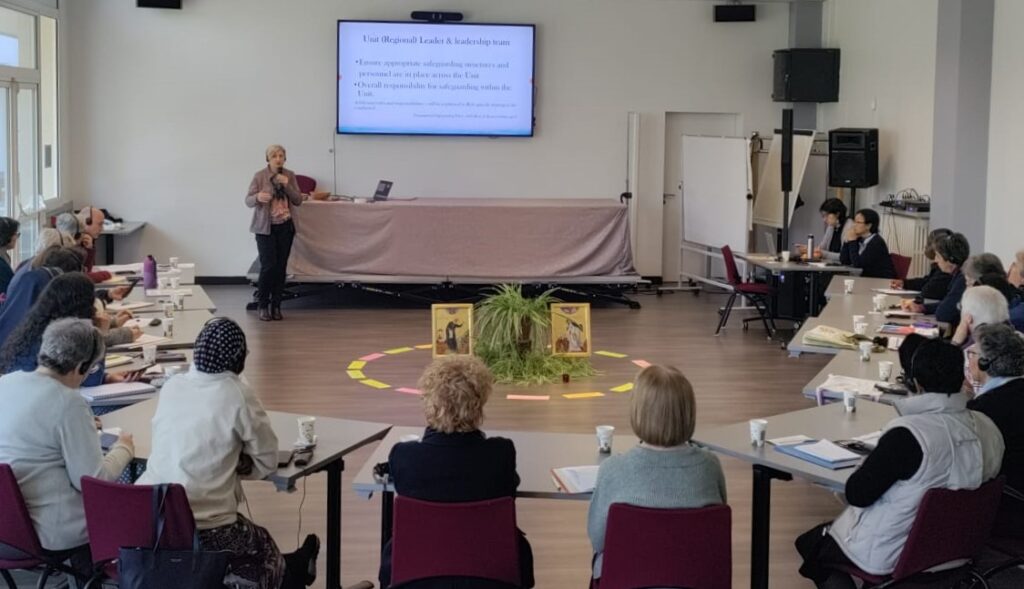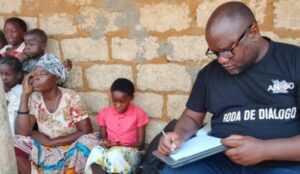By Bernardino Culombola, Safeguarding Training Facilitator, SAM
The Sector of Angola and Mozambique (SAM) has taken significant steps since 2021 to implement the Congregational Safeguarding Policy. Led by Sr Marcelina Domingos de Nascimento, Sector Coordinator, SAM adopted the Congregation’s guidance, creating a sector safeguarding committee and a team responsible for the implementation of the policy.
Sr Marcelina recently took part in a question-and-answer session with the sector’s Safeguarding Training Facilitator, which we share with you here.
Why is safeguarding important for our mission and who is responsible for implementing the policy in Angola and Mozambique?
Safeguarding is a mechanism that contributes to the well-being of everyone in the sector, promoting a safe environment in which all mission partners relate to each other and guaranteeing the protection of children and the most vulnerable.
We are all responsible for implementing the safeguarding policy across the sector regardless of our role, project, program, ministry, or area in which we work – we all seek to align how we implement the policy.
What are the main outcomes of implementing the safeguarding policy in the sector?
The outcomes of implementing the policy are quite visible.
A capable, competent team has been created to ensure its implementation in both Angola and Mozambique in line with national legislation.
Since 2021, we have adapted and shared the policy and the code of conduct in all apostolates, programs, and ministries of our seven communities in SAM, where we have also carried out training sessions which have led to attendees receiving certifications in safeguarding.
We have implemented the policy in our recruitment processes and have mobilized partners-in-mission and associates to ensure consistently safe environments throughout the sector.
These actions have led to a deeper understanding of the safeguarding policy. Of course, we are aware that this is a journey – and that there is still much to be done!
What are the greatest challenges in implementing the policy?
Our greatest difficulty is covering the costs for training, monitoring, and evaluation at the community level. Even though we have a training facilitator who is part of the international safeguarding team, our other challenge is to have trained personnel who exclusively work on safeguarding.
What have you done, as Sector Coordinator, to ensure greater ownership of safeguarding and make it a priority in SAM?
The sector has done everything it can to include safeguarding on the governance agenda. SAM – with the support of the safeguarding training facilitator – has promoted regular awareness training and meetings for sisters, partners-in-mission, staff, and other associates.
Themes concerning safeguarding have been included for discussion during the sector coordinator’s community visits. The sector plans to hold an assembly in which the theme of safeguarding will be discussed in order to find solutions to some of the challenges previously mentioned.
What message would you like to share with the Congregation?
We would like to thank the Congregational Leadership Team for their efforts and investment in recent years to promote the internalization of safeguarding practices in all Units throughout our global Congregation.
We appeal to all sisters and partners-in-mission in SAM to take greater ownership of their role in safeguarding and to make it a priority within each of their communities and ministries, ensuring its effective implementation
Finally, we would like to reinforce the understanding that safeguarding is the responsibility of everyone – the contribution of each person is fundamental for safeguarding to become integrated into everything we do to carry out our mission.






